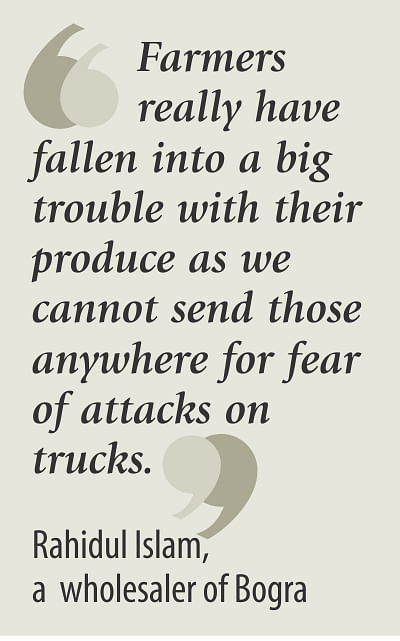Businesses bleed in blockade

The fleet of 75 buses of Nabil Paribahan, a popular bus service of northwest region, remains off the road since January 4. That has been a double trouble for the company. While it could not earn a coin in these six days, it had to count Tk 50,000 in daily business operation cost. Its 650 drivers, helpers and supervisors had no work and therefore no pay, except for food allowance.
This has been the case also for nearly 250 inter-district bus operators, thanks to the recent spate of political unrest that forced them to suspend operation.
“It's the peak season and our businesses had just started picking up. But we're caught up in the political turmoil,” said Anisur Rahman, general manager of Nabil Paribahan that operates 65 trips a day, earning Tk 6 lakh on average.
“Our drivers and helpers are employed on no-work-no-pay basis. One helper sought a loan from me,” he said.
BUSINESSES BLEEDING
Road transport, the means for movement of more than 80 percent passenger and freight volumes, has once again become the most affected sector for the return of blockade, shutdown and arson and bomb attacks since early this month.
Usually, some 2 lakh passenger buses and goods-laden vehicles ply across the country every day. Of them, about 76,000 are buses and the rest are goods carriers. For each day's suspended operation, owners incur a loss of up to Tk 7,000 per vehicle, said Abul Kalam, vice-president of Bangladesh Sarak Paribahan Samity.
Transport sector makes up 7.31 percent of the country's GDP. When this sector bleeds, it affects many other sectors of the $150 billon economy.
As an immediate impact of the blockade, prices of farm produce have fallen at farm levels. In response, many farmers have stopped harvesting their produce, causing a demand-supply gap. In the domino effect, prices in city markets have soared.
Supply and distribution of industrial and essential consumer goods are also facing disruptions. Fearing attacks, trucks and vans have been keeping from the streets. The few that ply charge high fares, in some cases double the usual amount.
Fear of violence is taking a toll also on domestic tourism at a time when it is otherwise at its peak.
Economists apprehend that if the unrest prolongs, its effects on the economy will be like last year's. While it will hit people of all groups, those from middle and low income brackets will be the hardest hit.
The economy is yet to recover from the loss of last year's 53 hartals and 19 blockades, as the investment climate is yet to be restored.
Nationwide shutdowns and blockades in six months prior to the January 5 election last year cost the transport, garment, agriculture and tourism sectors Tk 49,017 crore, according to the Centre for Policy Dialogue.
The think-tank estimates that a day's shutdown shaves around 0.9 percent off the gross domestic product a year at market price.
Zahid Hussain, lead economist of the World Bank, Bangladesh, said the losses incurred from the blockade could be made up only if normalcy returned quickly. But the income loss of the lower income people will become permanent if the unrest lingers.
Atiqul Islam, president of the BGMEA, said the re-emergence of political turmoil did not bode well for the economy. "Factories need raw materials from home and abroad, but supply is being cut off because of the nonstop blockade. Our shipments too are affected."
GROWERS AT A LOSS
Four days of blockade so far this year, and farmers are already counting heavy losses. Prices of some vegetables at the farm level have fallen to an extent that they do not fetch the production cost.
“The situation is similar to last year's political chaos. We incurred huge losses then and we are going to incur losses again,” Zinnath Ali Kosba, a farmer in Dinajpur, told The Daily Star.
Jitendranath Roy, another farmer in the district, said he could sell only half his produce as there was no buyer in the wholesale market on January 6, the first day of the blockade. Later, he sold off his crops at a throwaway price.
In Bogra's Mahasthan Bazar, a vegetable wholesale depot in the north, cauliflowers were selling at Tk 1 per kg, down from Tk 5 before the blockade. Prices of cabbage, potato and aubergine have also slumped sharply, said Rahidul Islam, a wholesaler there.
He added some trucks were taking risks to hit the streets, but were charging double, a fact Rustom Ali Khan, general secretary of Bangladesh Truck and Covered Van Owners Association, admitted.
TOURISM SECTOR
Flows of tourists to the beach town of Cox's Bazar, country's most popular tourist destination, have dipped.
On January 2, the city hosted some 1 lakh tourists. On Wednesday, there were only about 1,000 tourists, said Abul Kashem Sikder, general secretary of Hotel, Motel and Guest House Association in Cox's Bazar.
“Those who had come earlier somehow managed to return to where they came from. But those who booked rooms in advance later cancelled. Who is going to come here in this situation?” he said.
PROBLEM IN SUPPLY
Companies are facing difficulty to ensure smooth delivery of their products throughout the country.
Kamruzzaman Kamal, director (marketing) of Pran-RFL group, said the company operated 700 distribution trucks to supply processed food, milk, plastics and kitchen ware, among other products, on a normal day. But the blockade has forced it to bring down the number to 400.
“If the blockade continues, it will adversely affect us. Our production and sale will come down and we will then buy fewer raw materials such as agricultural produce and milk.”
He added the blockade was also hampering timely exports of their products.
(Our correspondents from Bogra, Dinajpur and Lalmonirhat also contributed to this report.)

 For all latest news, follow The Daily Star's Google News channel.
For all latest news, follow The Daily Star's Google News channel. 



Comments